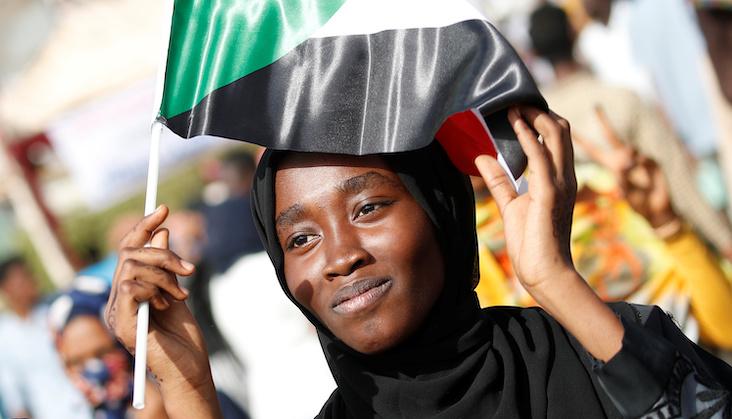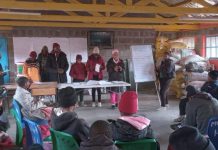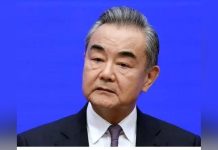Africa-Press – Lesotho. When the bulwark finally crumbles it looks like destiny. And yet the Sudanese protesters who caused the removal of President Omar al-Bashir on 11 April were far from certain of success.
Bashir, who seized power in a military coup in 1989, had crushed two similar protests in 1992 and 2013. And yet in December 2018 crowds once again took to the streets of Khartoum.
What began as a protest against a tripling of the price of bread became a widespread movement against Bashir’s hardline government, backed up by professional organisations and women’s groups, until the military ousted the leader. The youth-led revolution did not get this far to be ruled by old men in uniform.
Thousands still fill the streets of Khartoum demanding a civilian government.
They now face a crucial test, as the country careens towards its dream of democracy without the governance institutions necessary for stability.
A dangerous combination of a lack of job opportunities, poor economic growth, a growing youth demographic and an authoritarian government have pushed a generation of people with decades of life ahead of them to the limit.
According to the African Development Bank, more than 200 million of the continent’s 1.2 billion people are aged between 15-24, and that number is set to rise to 321 million by 2030. Sudan’s youth-led protest movement is one of several around the continent. Some coalesce around a figurehead; others around a cause.
But – as was seen with the Arab Spring movements of 2011 – when and if they reach a tipping point depends on the various and complex circumstances of each country: the structure and health of its politics, the quality of youth leaders and the individual choices of millions and millions of young Africans.
Protest, disengage or leave Africa is no exception to the rule that young people are less likely to be engaged with traditional politics than their older peers.
While opinion polls show that young Africans discuss politics to the same extent, a lower percentage of them vote and a higher percentage participate in protests.
But frustrations about poor public services and a lack of jobs can equally contribute to apathy or a desire to leave the country in search of brighter prospects somewhere else.
As recent events in Sudan and Uganda show, countries that have autocratic governments and few jobs for young people have the hardest time engaging with youth.
Thirty-seven-year-old Robert ‘Bobi Wine’ Kyagulanyi Ssentamu, a musician and member of parliament for Kyadondo East in Kampala, wants to represent this youth demographic fed up with the 33-year rule of President Yoweri Museveni.
In November 2018, he was in Accra to attend the 2018 All Africa Music Awards but offstage he addressed a gathering of supporters and listeners at Mmofra Park. Malema and Bobi Wine see each other as part of the same battle
Kyagulanyi engages the crowd, some of whom took part in the worldwide protests that erupted when he and more than 30 others were abducted and brutalised by the Ugandan armed forces during Arua’s by-election in August 2018.
He spoke of how, rather than working to improve government, many parliamentarians were focused on enriching themselves, some going as far as to tell him to “go slow” and enjoy his pay cheque.
Citing legislation passed in 2013 prohibiting political meetings of more than four people without police permission, he hammered home the great divide between leaders and the people, and how parliament passes unjust laws to keep the people subjugated. Politics, the ‘official platform’
Born in the Kamwokya slum in Kampala, where his family lived while his father was in prison for his role in President Yoweri Museveni’s bush war, Kyagulanyi was already a household name by the time he announced his candidacy for the Kyadondo seat in 2016.
His music gave birth to his activism and nurtured his political growth, he told those gathered in Accra: “As a musician drawing inspiration from Jamaican artists like Buju Banton, Bob Marley and Sizzla, there was a general narrative of dissing politicians and describing politics as ‘poli-tricks’.
I was using my music as my platform of activism to demand what should be in place. But as I grew up I realised that it is one thing raising a voice and and another thing actually changing the way things are. ”
Kyagulanyi says he wanted to use the ‘official platform’ to amplify the issues he had long sung about and that the people he lives among want communicated; he was among oppositionists attempting to prevent the removal of presidential term limits and the introduction of a social media tax to muzzle activism.
“Bobi Wine is riding an inevitable wave,” says Kampala-based analyst Angelo Izama.
“Demographic changes in Africa will produce yet unforeseen consequences. His movement puts a youth banner on economic injustice. It resonates because, well it is true. ” Primary school enrolment is estimated around 90%, but only 38% complete it.
University graduates can find themselves competing with 50 other candidates for every available opportunity, while ‘informal sector’ employment is opposed through the state’s destruction of settlements and places of work.
But will Kyagulanyi’s popularity and ‘People Power’ slogan change the way Uganda runs? Some analysts believe that though he has much support across the country, he has no established grassroots structure on which to build a political movement.
“What’s his politics, beyond the critique? How would he balance the kind of issues that the nation faces?” asks Ugandan journalist and blogger Rosebell Kagumire.
“He’s a lone voice that has a platform, but if he were to be a presidential figure he would have to show whether he has a committee of people, how he would govern, the idea that he’s leading a movement that is visible beyond himself.
” Over the years opposition movements in Uganda have grown and fizzled out.
“[The] highly polarised foundation upon which politics rests is two and half decades of divide and rule.
and a dangerously volatile commercial market for politics.
[This] will meet with the naked violence of the heirs of the movement under Museveni,” says Izama.
“What happened in Arua is only the first draft of the history to follow.
” How political change will come when Museveni is no longer in power depends on its timing and several other factors.
“It matters that they [the youth] are at least excited by the show,” says Kagumire.
“They see [Bobi Wine] as a sign of change in the truth teller at the time when everybody has been beaten by the system.
He will have to up his game to be able to win via the streets or the ballot box when the cult of personality loses its leader, since the factors are not ripe for a revolution.
Meanwhile in South Africa, which has a stronger democratic system and state institutions, youth politics of late has grabbed national attention through the #FeesMustFall movement and organising activity of Julius Malema and his Economic Freedom Fighters (EFF).
Malema and Kyagulanyi see each other as part of the same battle. “Museveni firstly must go and rest, and rest on his oversized suits as well,” Malema tells The Africa Report.
“Bobi Wine is an inspiration, [he] is a brother to us. Even if he can’t defeat him through using the state institutions and democratic processes, nature will resolve the man [Museveni].
So Bobi Wine, soldier on young man, victory is certain. ” With an ear to the ground, Malema and the EFF have tapped into the concerns of those who feel marginalised.
The EFF has also managed to push popular policy positions – notably on land reform – and the debate on the nationalisation of mines to such an extent that it has caused radical shifts in the governing African National Congress’s position.
Part of the EFF’s political appeal lies in how it has positioned itself at a time when a lot of people are looking for political alternatives, says Tasneem Essop, a researcher at Wits University: “Given the socioeconomic context, deep inequality and sky-high unemployment, the language of the EFF speaks to this and the many popular struggles that have been unfolding in the country.
” Ahead of the May 2019 election, opinion polls give the EFF an expected 11% support. This almost doubles the 6% it got in its first elections in 2014, and would give it more clout in the opposition benches of parliament.
The EFF became coalition kingmakers in several major cities after the 2016 municipal elections, but the horse-trading of divided governments has done little to boost the party’s national profile.
It is doing well on university campuses and using social media to mobilise voters, but it will need to speak to more than young people to make a bigger electoral power push.
In Nigeria, getting your name on the ballot when you are not a billionaire or the ‘godchild’ of a political bigwig presents its own form of revolution.
In May 2015, agitation for the Not Too Young to Run bill began in earnest as a number of civil society groups sought to get parliament to amend laws regarding youth participation in politics at all levels.
This has served as a springboard for young candidates, increasing their number facing the elderly establishment. The group’s mission was to reduce the age qualification for president from 40 to 30; governor and senator from 35 to 30; house of representatives membership and state assembly membership from 30 to 25.
The Youth Initiative For Advocacy, Growth & Advancement led a nationwide drive to get the bill considered at the national level. Promises of tech hubs are unlikely to quench youth demands
In April 2018, it was signed into law by President Muhammadu Buhari, leaving room for many young Nigerians to run for elective offices in the 22 February elections.
In Lagos, Gbadebo Rhodes-Vivour, a 35 year-old MIT graduate, ran for the Senate, while Rinsola Abiola, daughter of the winner of the annulled 1993 presidential elections, Moshood Abiola, joined the race for the national assembly in the state of Ogun.
In the Middle Belt, Natasha Akpoti tried for a senatorial seat in her native Kogi, while 35-year-old Chike Ukaegbu was the youngest presidential aspirant in this year’s polls.
Even though the odds were stacked against him, this was emblematic of a paradigm shift. Inspired by their neighbours, youth groups in Cameroon are also using the political structures to seek younger political participation in their country.
The organisation Network for Solidarity, Empowerment and Transformation for All (NewSETA) started a campaign known as #VOTE18, aimed at lowering the voting age in Cameroon from 20 to 18.
NewSETA’s director, Ateki Caxton, saw Nigeria’s #NotTooYoungToRun campaign as a success story. He is also planning to launch a campaign to lower the age to run for Senate and build young people’s capacity to run for office.
“We believe that age is not a factor to determine whether someone makes a difference in society or not,” Caxton says.
#VOTE18 faces an uphill battle in a country where octogenarian President Paul Biya has been in power since 1982 and has a strong grip on the three arms of government. At this point, political change is not likely to come through the ballot box in Cameroon.
The same country is producing young combatants in the Anglophone region who are fighting for secession; it is witnessing Boko Haram attacks in its poorly developed northern regions and sending many young people northward across the continent in the hopes of finding something better along the way or in Europe.
Sahel separatists In countries where states are unable to exercise their authority over all of their territory and governments are dysfunctional – like Mali and Somalia – the youth bulge presents its most serious challenges to African leaders.
Less than a third of the Malian population voted in the second round of the 2018 presidential election, pointing to a general disillusionment with what traditional parties have to offer.
While there are 18 million Malians in Mali, there are four million in the diaspora. The government has been unable to tackle jihadist movements, Tuareg separatists and trafficking networks across the Sahel region.
As young people question the status quo and push the limits of old systems, promises of tech hubs and digital job creation seem less and less likely to quench the demands of the coming demographic surge.
With today’s politicians shaping many possible tomorrows, the Arab Spring, the Sahel, South Africa, Ethiopia and Uganda show how the politics of youth can shift the dial or send a country into crisis.
For More News And Analysis About Lesotho Follow Africa-Press






